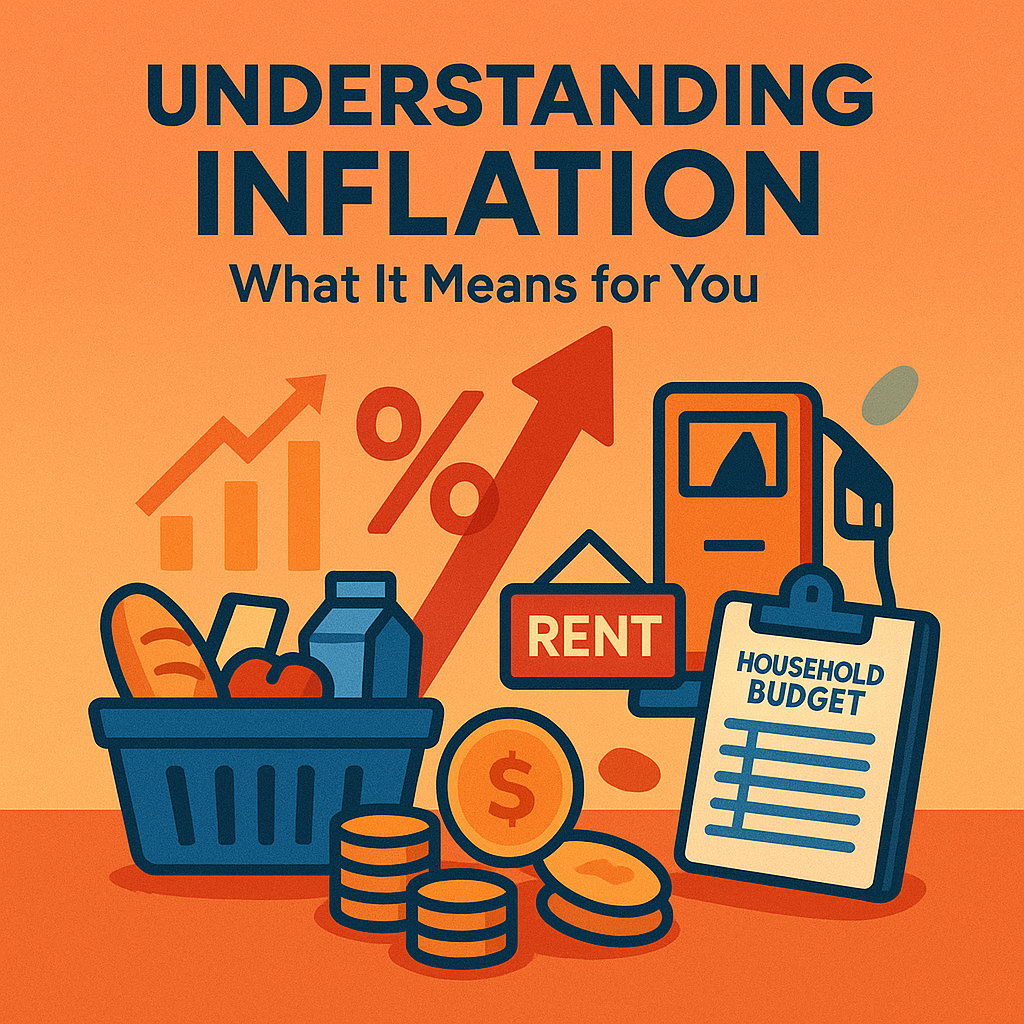Table of Content
What is Inflation?
Types of Inflation
What Causes Inflation?
How is Inflation Measured?
The Impact of Inflation on Your Wallet
Winners and Losers of Inflation
How to Protect Yourself from Inflation.
Is Inflation Always Bad?
07 Inflation Trend in the 2020s
Final Thoughts: Planning for an Inflationary Future.
What is Inflation?
Inflation is the rate at which prices for goods and services increase, in other words, it is the decrease of purchasing power over money (which means that when inflation increases, your money buys less).
Let’s say that your monthly grocery bill was $200 last year, and now your monthly grocery bill is $220, that is inflation at play. Inflation is part of our everyday economic life. If inflation gets too high or unpredictable, it results in financial stress for households.

Types of Inflation
- Demand-Pull Inflation
Demand-pull inflation occurs when the demand for goods and services exceeds its supply. When there are more people with money to spend, businesses can charge appropriate prices.
Example: at an early stage of the pandemic, stimulus checks helped increase consumer spending, which resulted in demand-pull inflation.
- Cost-Push Inflation
Cost-push inflation occurs when costs of production (like labor or raw materials) increase, and companies pass that cost down to consumers through higher prices.
Example: An increase in oil prices will increase the cost of transportation and manufacturing, which will cause consumer prices to increase.
- Built-In Inflation
This is inflation that happens over time because of prior inflation. Workers will expect that prices will be higher, so they will demand higher wages in anticipation of costs rising further, thereby further exacerbating costs and inflation.
What Causes Inflation?
There are many causes of inflation.
Higher Consumer Spending
Increased spending due to economic booms or a boost from the government.
Disruptions to the Supply Chain
Shortages in the supply chain (e.g. due to COVID-19) will increase the price of goods.
Increases in Wages
When wages go up, a business may raise prices in order to recoup the higher wages.
Higher Prices for Oil and Gas
Energy is required for almost every sector and supports almost every cost in the economy. If oil and gas prices suddenly increase, the ripple effect will greatly affect every industry.
Loose Monetary Policy
Central banks that print too much money or keep interest rates too low for too long.
Measuring Inflation
- Consumer Price Index (CPI)
This is by far the most common measure of inflation. It measures the average price change over time of a “basket” of goods and services. - Producer Price Index (PPI)
Measures the change in selling prices received by producers. It is often seen as a predictor of consumer inflation. - Core Inflation
The core inflation measurement excludes volatile items like food and energy that may skew results to show below underlying trends.
How Inflation Affects You
Inflation affects your financial well-being and can be insidious in the following ways:
- Cost of Living is Rising
The price of groceries, gas, rent, utilities, etc., all get more expensive. You may not feel the strain until those prices have steadily increase; 1% or 2% increases don’t seem like a lot, but they count. - Salary/Time Lag
Even if your salary does not raise with inflation, your real income lowers – you earn the same, but you can buy less. - Savings Lose Value
Cash sitting in your bank account will lose purchasing power as time passes unless it is earning interest above the stability rate of inflation. - Fixed Loan Payments
If you have a fixed-rate mortgage or loan; inflation can help you. Payback will be in “cheaper” money.
The Winners and Losers of Inflation
✅ Winners
Borrowers: Fixed-rate debt is easier to pay off.
Real estate owners: With inflation, property values typically rise.
Investors in stocks or commodities: Asset values will often increase with inflation.
❌ Losers
Savers: Bank savings are losing purchasing power.
Fixed income retirees: Pension payments and annuity payments may not adjust for inflation.
Low-income households: Tend to spend a higher portion of their income on necessities which are likely to rise in price.
How to Protect Yourself From Inflation
- Invest Wisely
Stocks, real estate, inflation-protected bonds (TIPS in the U.S.) will keep your money from losing value. - Diversify your income
Side-hustles, e-commerce business, or rental income will allow you to keep pace with higher costs. - De-leverage bad debt
High-interest loans, especially many variable-rate ones, can become dangerous in inflationary periods. - Improve your financial knowledge
The better you know how money works, the more adept you will be managing it in uncertain times. - Budget and track your spending
Eliminate unnecessary expenses. Use apps like Mint, or YNAB to help you track how inflation is impacting your spending.
Is Inflation Always Practically Bad ?based on
Not really. Moderate inflation (literally 2%!!) is actually healthy and a sign of economic growth.
Here are a few advantages of measure
- it stops people from hoarding their money and encourages spending and investing.
- it makes debt repayment easier.
- it boosts wages (a sign of a healthy economy).
However, hyperinflation or stagflation (inflation with stagnant growth) can be devastating.
Inflation from 2020 into the 2020s.
Inflation plauged the world from 2020 into 2023, due to:
- COVID 19 shutdowns (supply chain issues all over the world).
- Unprescedented and massive government spending programs.
- The Russia – Ukraine war (energy & food price explosions).
We see inflation in recent decades and then some; but now more consistenly at the highest levels in decades, in the United States, United Kingdom, European Union, Canada, and in many others. When Central Banks had slowly raised key interest rates it was too late for consumers who began to feel the effects as early as 2025.
In summary: Plan for an inflationary future.
Inflation is not to be confused with an economic term alone – this impacts every single person who has ever bought groceries in their life and cannot depend or spend their savings. Inflation is basically how far your money actually goes on your groceries, and even your bank or cash balance.
If you want to put yourself ahead of inflation:
- be aware
- change your financial status strategies
- and do away with cash based on the best asset available
Your best defense against inflation is education and action.
💡 For reference, every-time you have free money that rolls up to 5% inflation if you have $1,000 it only cancels it our by 5% (equal to $950). Don’t let your money sleep – make it work!
